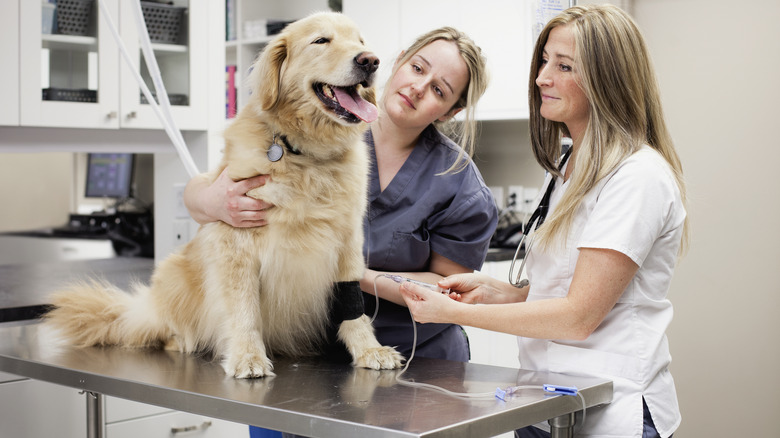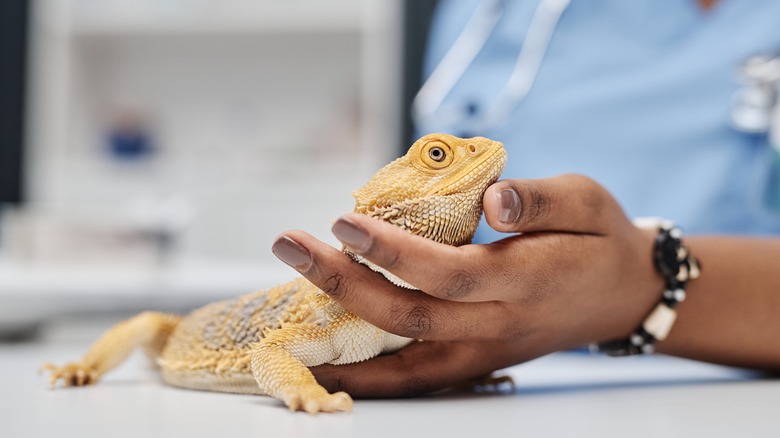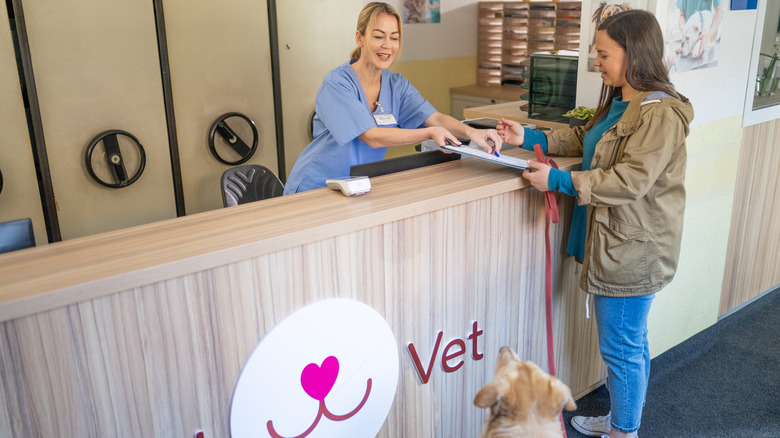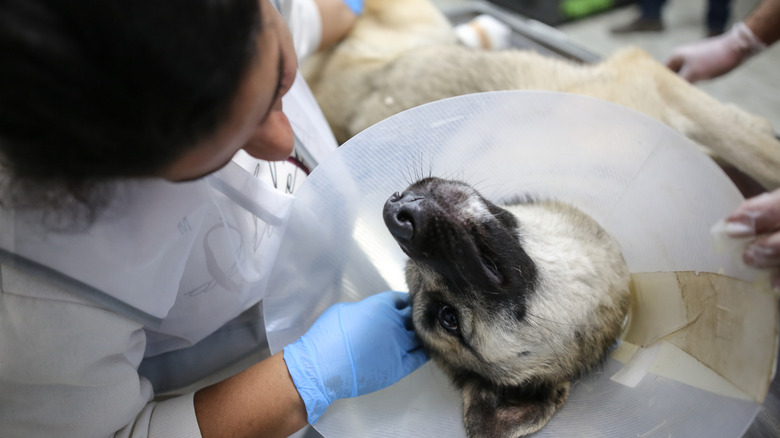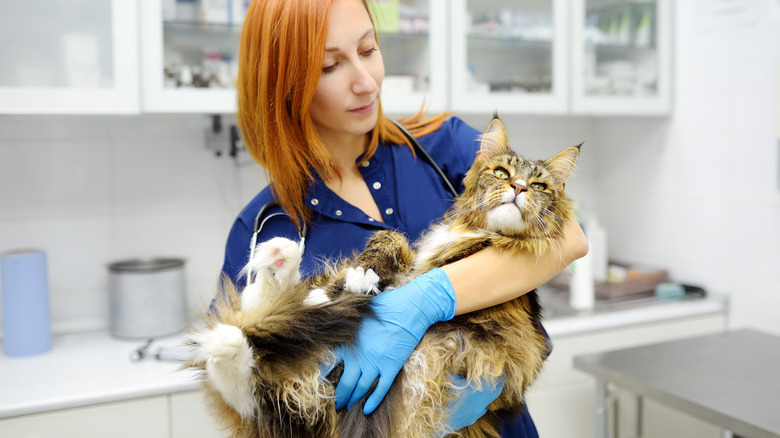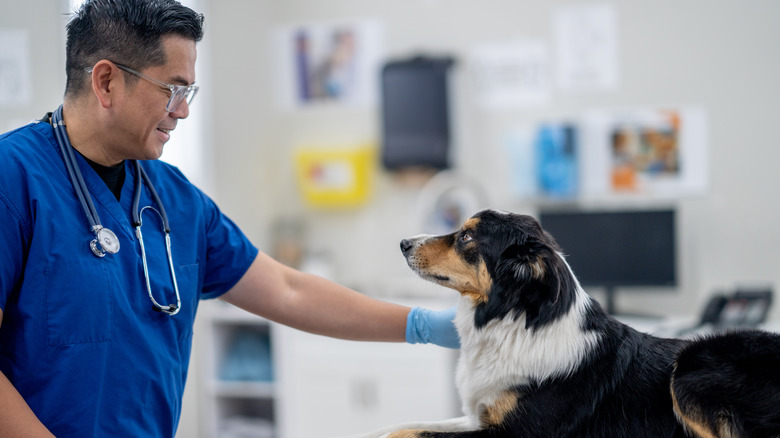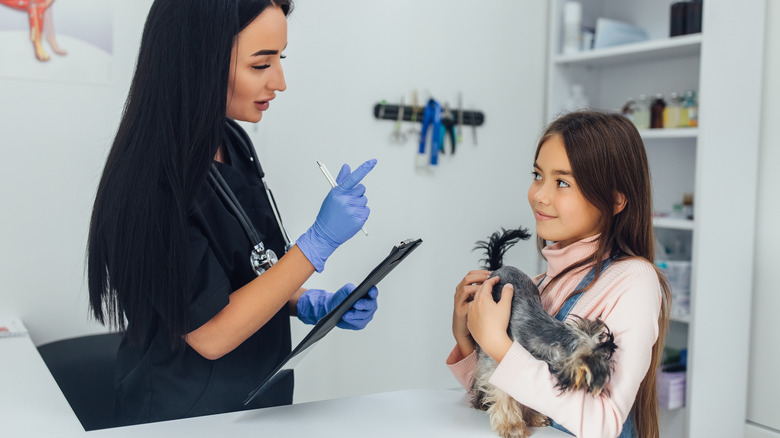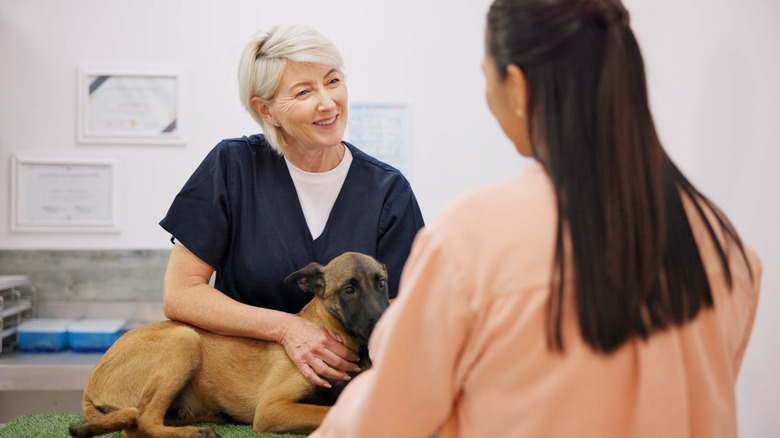14 Questions You Need To Ask When Searching For A Regular Vet
Veterinary medicine has come a long way in recent decades, opening the door to advanced procedures that can extend and improve your pet's quality of life. But when you get right down to it, the hunt for a vet really isn't that different from searching for a doctor yourself: You're looking for that ideal combination of someone who possesses the technical skills to provide the care your animal needs and the right personality, staff, and clinic environment to set you and your pet at ease.
Of course, there's one extra challenge: Your pet can't talk to tell you if something is wrong. So it's up to you and your veterinarian ally to astutely piece together the sometimes subtle signs that tell you how the beloved animals in your life are doing.
Ideally, you'll do your hunting for a veterinarian early on, so they can help ensure your pet's health through regular wellness checks that assess their quality of life and hopefully catch any problems before they escalate. But even if you feel like it's late in the game — maybe your pet is older or newly sick, and you now need professional assistance — asking targeted questions can help you find the best vet for you and your fur child.
1. How many veterinarians are at the practice, and what are your backgrounds?
There's no single right answer to this question. Some pet owners enjoy bonding with a vet in solo practice, while others appreciate the convenience of a clinic whose multiple vets increase your chances of having someone available at odds hours, over the weekend, or just generally on call. However, there are a few key pieces of information you should look for.
Start with whether the clinic's vets have experience with and a preference for treating the type of pet you have, along with any pre-existing conditions they may live with or are prone to developing, such as diabetes or hip dysplasia. Cats and dogs are by far the most common household pets and will be treated by most vets, although some will have a clear inclination on which they prefer to work with. In fact, certain clinics only serve cats.
However, if you have what's often referred to as an "exotic" pet, which includes birds, rabbits, reptiles, pot-bellied pigs, and rodents like gerbils, the pool of veterinarians with expertise in treating your loved one will be smaller. Even hamsters — a common "starter pet" during childhood — are technically classified as an exotic. Lastly, availability does matter. If the clinic's open hours don't match your ability to get your pets there, it's a no-go no matter how excellent the vets are.
2. What services do you offer?
Any veterinary clinic will be able to do basic exam procedures, such as weighing your pet, listening to their heart and lungs, taking their temperature, and palpating (feeling) their body. But do they have an in-house laboratory or x-ray clinic? What about an MRI, or a doctor who performs ultrasound? A pharmacy to fill prescriptions and provide medications in-house?
Hopefully, you won't need any of these services on a regular basis, and maybe if you and the clinic are otherwise a perfect match, you'll even forgo them in favor of a vet you feel great dealing with. But in an emergency, quick access to diagnostics can be life-saving; and even in less-urgent situations, getting fast results back can give you peace of mind and save you the bother of scheduling at another facility.
Here are a few other types of procedures to consider asking about: Can veterinarians at that office do surgeries? Do they have a network of veterinary specialists they can consult with or refer out to if needed? And lastly, what about non-medical services, like grooming, training, and socialization? None of these are automatic deal-breakers — it all comes down to your preferences — but making an informed decision now will help you find a vet clinic that best meets the needs of you and your pet.
3. How do you handle appointments?
Many veterinary clinics are still digging out of the overload they experienced during the COVID-19 pandemic, as well as a more gradual squeeze dating as far back as the 1980s, when pet ownership started climbing faster than availability of veterinary services. While the American Veterinary Medical Association projects that veterinary schools will soon catch up to that need, there's no denying that at least for now, you may have to wait for weeks — or more — to be seen at some vet clinics. Others have closed their doors to new patients in order to better serve their existing client base.
All of that means that when you first consider a new veterinary practice, you should ask about the appointment scheduling. Discover how far out they're booking for appointments, urgent and otherwise. Some clinics schedule months ahead for wellness appointments, while holding open same-day or same-week slots for more urgent cases; others will simply tell you that in case of urgent problems, you need to go to a pet emergency or urgent care facility. If you're dealing with a multi-vet clinic, you should also ask whether you can book to see a specific vet, or if they only schedule according to availability — in which case you're playing the lottery as far as which veterinarian you'll see.
4. In what ways are you available to communicate?
Many vet clinics are very open to communication across mediums; they respond promptly to inquiries via email, text message, and phone, too. Certain clinics even offer veterinary telehealth appointments by video call, or they may have on-call vets or after-hours answering services that can pass urgent inquiries on to one of the doctors.
This goes double if English isn't your first language. In that case, you might or might not be able to find a vet who speaks your native tongue — but if you look, you should still be able to find one who's willing to dedicate the time and energy to making sure you understand what's going on with your pet and their health. Ultimately, the common denominator here is you: Whatever level of communication and accessibility you're looking for, ask in advance to make sure the clinic can provide it.
5. What's the vibe with the staff?
A certain amount of interpersonal drama is natural in any office setting, veterinary or otherwise. But if you visit the clinic you're thinking of taking your pets to and notice undercurrents of tension and stress among the staff — or heaven forbid, outright conflict — then you might be looking at a toxic environment that could affect the level of care your pet receives.
It's not that this means the staff or vets would deliberately deprive your pet of care. It's more that any energy they spend on managing that constant, underlying level of stress is energy that they can't put towards taking care of your pet. Both cats and dogs are adept at picking up on human emotions, so they'll be able to tell if the vibe is off, too. And just as an observant pet owner can read their cat or dog's body language, the same human body language cues that tell you something's off among clinic staff can create a more stressful visit for your pet.
6. Is the clinic clean and well-organized?
It might seem a little strange to ask this as an outright question, but it's something you can keep in mind during your first visit, whether that's bringing your pet in for care, checking out the clinic to see if you want to take your pet there, or while reading online reviews. Proper cleaning and disinfection protocols are critical elements of keeping your pet — and every other patient at the clinic — safe by stopping cross-contamination and the spread of infectious diseases.
Just like with humans, the need for cleanliness extends to your veterinarian and vet tech's hands, too. Frequent hand-washing and use of gloves and sanitizer when appropriate helps prevent the spread of diseases in any context. Additionally, thoroughly cleaning the appointment space between each exam may help your pet feel less stressed by reducing the likelihood that they'll encounter a foreign scent left in the wake of another animal.
The bottom line is that a dirty, disorganized clinic (or staff with unwashed hands) is the clearest possible signal that something is awry. It may mean that your pet won't receive the best possible care at that office, and could also point to any number of other underlying issues, from office politics to poor record-keeping and even a simple lack of medicinal knowledge. You can't fix the state of that office, but you can decide to take your pet elsewhere.
7. What happens during emergencies?
When your pet is subject to an emergency, whether it's something internal like heart problems or an intestinal blockage, or perhaps a snake bite, an emergency Caesarean section, or the result of attack by another animal, things move very quickly. So it's best to know ahead of time whether the veterinary clinic you're considering is equipped to handle emergencies on a walk-in basis.
If the vet clinic you're considering does not take emergency cases, ask them if they recommend a specific animal hospital or urgent care. They may direct you toward one that is known for its standard of care, collaborates well with sharing medical records back and forth, or both.
8. What's your payment policy, and where can I get help with bills?
Just like everything else, the cost of veterinary care is going up, thanks in part to inflation and also to the fact that as veterinary science advances, there is more professionals can do to treat and prevent health conditions. At a good veterinary clinic, you should be able to have an open, honest discussion with the staff about how much procedures cost and what kind of financial assistance they offer, as well as their general policy around payments.
Depending on the clinic, you may be able to arrange for payment plans or deferred payment — especially if you're a long-established patient there. Others may offer sliding fees based on your income, have an in-house fund to help low-income patients, or refer you to third-party funding resources like CareCredit if you can't afford to pay the vet bill outright. Yet others won't even start treatment until they've received payment in full, a policy that has led to many crowdfunding campaigns created by owners who urgently need their pets to be seen.
Ultimately, you shouldn't wait until your pet is in dire need to find out how your vet clinic handles payment. Get that information now, while you're searching, so you can be sure you're landing at a facility that will accommodate your needs.
9. What certifications and accreditations do they have?
Do any of the clinics you're considering have special certifications? For cat owners, one important accreditation is the Feline Veterinary Medical Association's Cat-Friendly Practice Program, which offers creative solutions for all aspects of a vet practice, from waiting rooms to hospitalization, to help reduce stress on your cat while they're at the vet. Some clinics may also advertise themselves as following the principles of cooperative care or husbandry training — two different terms for the same idea: Consensual involvement from your pet along every step of the exam and treatment process.
Another important program for both dog and cat owners is Fear Free, originally created by Dr. Marty Becker, DVM. Fear Free clinics are meant to soothe — or entirely avoid — the fear your animal may experience while at the vet. Some characteristics of Fear Free clinics include the use of positive reinforcement; staying aware of and avoiding situations that can trigger fear and anxiety in your pet, such as being held down; enrichment via toys and treats; the willingness to back off and give your pet the space to decompress before another try at procedures like blood draws; and, when necessary, the use of pharmaceuticals like gabapentin to calm your pet and make the visit less stressful for them.
10. What kind of preventative care do you recommend?
This is a fantastic question to ask directly of the vet or their staff. Pay attention to not only what they recommend, but how they respond: Do they immediately rattle off a cookie-cutter answer, or do they ask a few questions about your pet's age, health history, and lifestyle (for example, whether your cat goes outside at all) so they can tailor any recommendations specifically to you and your pet?
If you're up for more pointed questions, ask specifically about parasites in dogs and cats, obesity, and periodontal disease, all conditions that can seriously affect your pet's health and lifespan — and which you can do a lot to prevent or at least mitigate. In addition to improving your pet's quality of life, preventative care can save you a lot of money in the long-run by avoiding the need for expensive procedures or medications. You don't want a regular vet who skimps in this department.
11. Does the clinic have a good reputation?
In this day and age, what search for a new provider would be complete without checking online reviews to see what sort of reputation the clinic in question has? Don't forget to ask around with your personal network, too, and with any relevant pet-owner or breed-enthusiast groups.
Of course, it's easy to generate fake online reviews, and per the tried and true customer service adage that "a happy customer tells a friend, an unhappy customer tells the world," it's not surprising that clients with a negative experience might feel more inspired to leave a review. But still, scanning the ratio of positive to negative reviews and looking for any common themes can give you a feel for how the clinic operates.
What's the most important thing to consider, by far, when checking a business's online reputation? Look at how they respond to negative reviews. A personalized, calm, and fact-based response is a big green flag.
12. Does it feel like the vet or clinic staff are pushing a hard sell?
If you've ever encountered a human doctor who seems overly eager to push pills or particular medications, it may not be that big of a shock to learn that some veterinarians operate under similar sales quotas. If you find yourself enduring the "hard sell" — pressure to buy things that feel incongruent with your pet's needs — then you might have found a vet who's more interested in hitting their numbers than personalizing care.
The bottom line is that if the vet isn't taking your personal financial situation into account, makes you feel guilty about not making what feels like an extraneous purchase, or leaves you feeling as if your money is their highest priority, it's a huge red flag. Keep on shopping for a different clinic.
13. Does the vet treat me like a partner in my pet's care?
The whole point of taking your pet to the vet is to benefit from the veterinarian's extensive training, experience and medical expertise. But remember, you're the one who lives with your pet, so you have a direct connection and responsibility that your vet does not. Ideally, you want to look for a vet who understands and values the close relationship you have with your pets, and treats you like an equal partner in their care.
Once you start chatting with the vet or maybe even with their staff, you'll quickly develop a good idea of how they communicate. The big green flag to watch for is if a veterinarian gives you the information you need to make informed decisions and proactively keeps you in the loop about your pet's care. If you're at a high-quality vet office, they'll also take your needs and desires into account while creating a treatment plan that suits your pet's circumstances. Red flags to watch out for include vets who only talk but don't listen, and those who talk down to you.
14. Do I feel comfortable asking the vet (or their staff) for help?
Just like us, pets can develop lifestyle issues such as overweight, obesity, inactivity, behavior problems, and matted fur. It can feel embarrassing to ask for help with conditions like these — but a good veterinary clinic will respond with support instead of shaming, helping you develop the tools you need to remedy those problems and keep them from popping up again.
Ultimately, empathy is a powerful tool in your veterinarian's practice. This can be a tough one to discern before your first visit, but if you're aware of any pending issues, like a cat with matted fur or a dog who's overweight, just ask about how they treat those conditions. If the front desk staff or vets are anything less than supportive, keep looking for another clinic.
